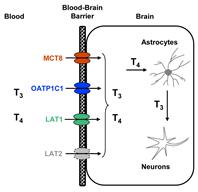We see lots and lots of thyroid hormone blood test results here. And understandably.
The brain is separated from our blood supply by the blood-brain barrier (BBB). This paper talks about an active process of transporters "pumping" thyroid hormones across the BBB - and what fails to work if that process does not happen.
We never see any measurement of thyroid hormone levels within the brain (understandably - not the sort of thing that can be done in two minutes in the phlebotomy unit). We end up relying on the subjective measure like how we feel. And, maybe, how the functioning of the brain affects other things like mood, balance, vision, hearing, muscle control, etc. It might be interesting to know what the brain thyroid hormone levels are - but we are not going to find out any time soon.
It is also interesting that the transporters also handle rT3. So does rT3 really have a function? Why else would it be actively transported into the brain?
The "aromatic amino acids" mentioned are:
Among 20 standard amino acids:
. phenylalanine
. tryptophan
. histidine
. tyrosine
Others:
. thyroxine
. 5-hydroxytryptophan
. L-DOPA
I warn you that some of the paper could be upsetting in its description of the effect on some people of transporter mutations.
How does thyroid hormone (TH) find its way into the brain? Although it has been known for a long time that TH is crucial for normal brain development, the exact molecular mechanisms involved in TH transport in the brain have remained elusive until recently. Early studies showed selective and saturable accumulation of TH in particular brain regions, suggesting that active transport processes are required for TH entry across the blood-brain barrier (BBB) and into brain cells (1). The discovery that TH transporter proteins located in the plasma membrane are required for cellular entry of the hormone has advanced our understanding of TH physiology. Thus, TH transporters mediate transport not only across the BBB but also into each individual cell of the brain.
Many transporters have been identified that accept a wide range of substrates, including TH (2). Monocarboxylate transporter 8 (MCT8) and its homolog, MCT10, are important exceptions, showing a high activity and specificity for TH (3, 4). MCT10 shows preference for T3 over T4, but also transports aromatic amino acids. MCT8 transports different iodothyronines (T4, T3, rT3, 3,3'-T2) with similar efficiencies but does not appear to transport aromatic amino acids.
jcem.endojournals.org/conte...
If you were interested in that, you might find this also of interest:
jcem.endojournals.org/conte...
... and the links from that page.
Rod


